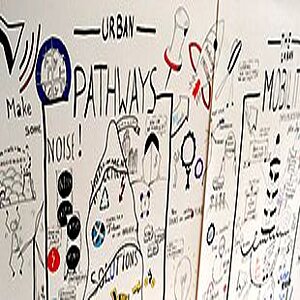Urban Pathways showcases climate actions from partner cities

The Urban Pathways project comes together for the final workshop to celebrate achieved urban climate action in 10 cities around the world

For the last five years, the International Climate Initiative (IKI) of the German Federal Government supported the project “Urban Pathways - Supporting Low Carbon Plans for Urban Basic Services in the context of the New Urban Agenda”, coordinated by UN-Habitat and implemented in collaboration with the Wuppertal Institute and the UN Environment Programme, among other partners. From 8-9 November 2022, the project culminated in the final workshop that was hosted in Berlin by the Zukunft Umwelt Gesellschaft (ZUG) gGmbH office, with more than 30 participants from German Ministries, City Governments, Civil Society, Research Institutions and Development Partners.
The speed and scale of urbanization imposes various challenges on cities, including meeting the rising demand for basic services and infrastructure. At the same time, urban areas are major contributors to climate emissions, whilst being increasingly exposed to climate and disaster risk.
“The important role of cities as the place for action for climate change has been emphasized during the High Level Meeting on the implementation of the New Urban Agenda in New York earlier this year” explained Andre Dzikus, Chief, Urban Basic Services Section, UN-Habitat, during his opening remarks. “Members States reaffirmed their commitment to ensure vertical integration for SDG implementation on all levels of government and provided the much needed prioritization of areas of action that countries can take to accelerate their transition towards a sustainable urban future. Strong emphasis was given to the areas of urban basic services and climate mitigation and adaption in cities”, he added.
“Cities have to be at the forefront of combating the climate emergency. It is against this background that the Urban Pathways Project could have not been more timely as it delivered on the combined aims and ambitions of the global agendas including the Paris Climate Agreement and the 2030 Sustainable Development Goals.” said Christine Krueger, Head of Section, Urban Development, Infrastructure and Mobility at ZUG, in her opening remarks.
„Cities form an important platform to address climate change challenges across the sectors. They often show excellent examples of cross-sectoral cooperation ranging from transport, public green spaces, to energy and water management in residential and industrial buildings. Cities have thereby often incited national governments to scale up their climate action. This is one of the reasons why IKI has been supporting city-level projects for years now.” added Verena Ommer, Policy Officer at the Federal Ministry for Economic Affairs and Climate Action (BMWK), during a panel discussion.
For the last five years, the Urban Pathways project has taken a very practical and demand-driven approach working with countries and cities that were highly motivated, and that had a supportive policy environment. The project contributed to reducing Greenhouse Gas Emissions by focusing on integrated implementation programmes in the area of mobility, waste management and energy as well as sector coupling. With support of Urban Pathways, a total of 14 pilot projects in 10 cities have been prepared and implemented ranging from a pedestrian zone, a mobility startup acceleration hub and energy efficient tiny house in Nairobi (Kenya); Ecozones in Belo Horizonte (Brazil); to electric mobility systems in cities such as Kochi (India), Hanoi (Vietnam) or Quito (Ecuador).
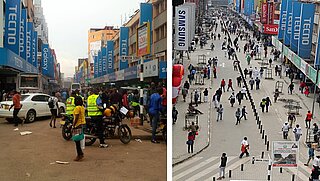
Positive impacts of these initiatives are illustrated by improvements on walkability, lower levels of emissions and pollution, enhanced road safety, increase in business opportunities, among others. For instance, Nairobi’s pedestrian zone “Luthuli Avenue” led to an increase of 29% of pedestrians with a particular increase of women and elderly – two societal groups that are now comfortably using the space due to improved accessibility, safety and comfort. In a survey conducted by partners, a total of 83.3 % of the respondents in Nairobi stated that they were in favor of the intervention. The majority of business stakeholders also commented very positively with regards to business improvements between 41 - 80%.
These pilot projects were developed in multi-stakeholder partnerships, so called “living labs”, that provided platforms for collaboration between government officials, civil society, academia and private sector to co-develop solutions for climate actions in a highly participatory manner.
This approach culminated in the launch of the Urban Living Lab Center in May 2022 that emphasizes the role of cities as testbeds for innovation and that supports cities through capacity building, policy advice, pilot project implementation as well as with the development of bankable projects to scale up the tested solutions.
Through the ongoing partnership of the Urban Living Lab Center that brings together Urban Pathways with EU funded projects such as SOLUTIONSplus on e-mobility or the Smart Energy Solutions for Africa (SESA) project, more than 60 Mio. EUR funding has been secured for projects, and more than 100 new partnerships were initiated, that support cities in their transition towards a more sustainable future.
The Urban Pathways project has been a great example of how international collaboration can play a key role in supporting cities with the development of local climate action plans through multi-stakeholder processes, that result in viable pilot projects with scale up potential in the future. While the project comes to an end, a seed was planted with concrete scale-up plans in many of the cities that already committed to additional urban infrastructure investments. In Belo Horizonte, five additional Ecozones are in the planning; and Nairobi continues to roll out pedestrian walkways and cycle paths across the city while also preparing for the Nairobi River Regeneration Initiative aiming to reclaim Nairobi River as a shared public good that supports a better urban and environmental performance for a better quality of life in the city.
The link has been copied to the clipboard
Contact
IKI Office
Zukunft – Umwelt – Gesellschaft (ZUG) gGmbH
Stresemannstraße 69-71
10963 Berlin
Voices on the project

“Urban Pathways has been instrumental in helping us to insert into our agenda the importance of building a more sustainable, climate friendly city through discussions on speed reduction, citizen participation and streets for people.”
Eveline Prado Trevisan, Coordinator for Sustainability and Environment, BHTrans, Belo Horizonte, Brazil

“Urban Pathways believed in us and our dreams and through their support we are transforming our city into a liveable city – thus abating the climate crisis and enhancing our living conditions.”
Cyprine Odada, Coordinator, Critical Mass Nairobi



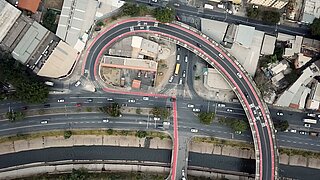


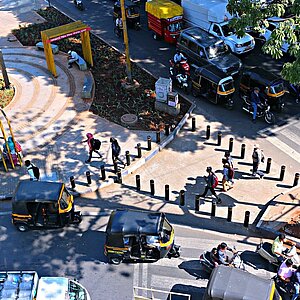

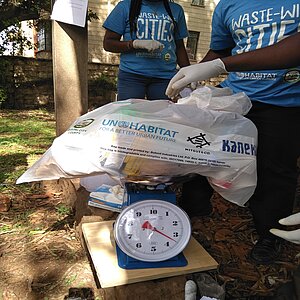
![[Translate to English:]](/legacy/_processed_/0/4/csm_20200710_Urban_Pathways_1_0417b47c3b.jpg)
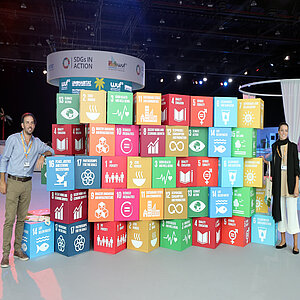
![[Translate to English:] Die Petronas-Türme im Stadtbild Kuala Lumpurs; Foto: Unsplash/Ishan](/legacy/_processed_/f/8/csm_180215_ishan-seefromthesky_Header310_661e6fc5b9.jpg)
